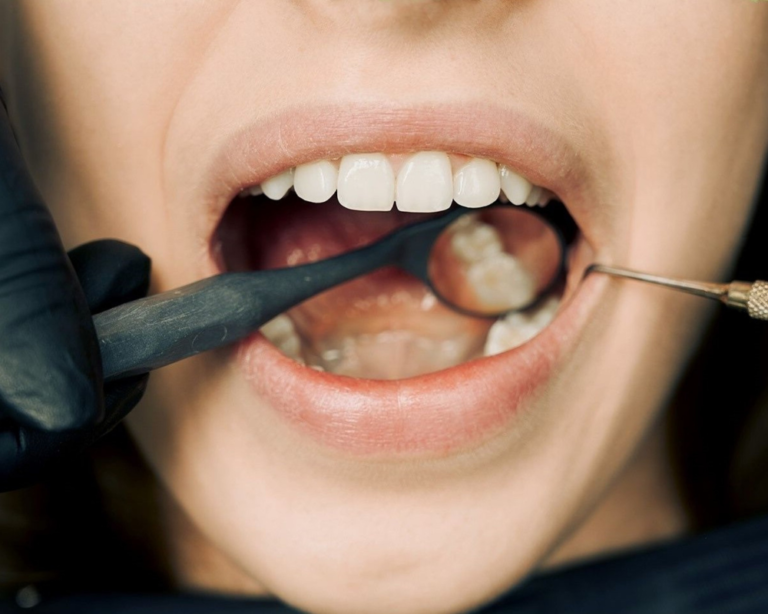Keeping your teeth and gums in tip-top shape is essential not only for a radiant smile but also for your overall health. For flawless teeth and gums, it’s important to understand how often you should visit the dentist.
The answer can vary depending on individual circumstances. Let’s break it down in a way that’s easy to understand and remember.

The magic number: twice a year?
The standard advice is to visit your dentist twice a year. This recommendation isn’t random; it’s based on the idea that early detection of dental issues can prevent them from becoming more serious and costly. Regular check-ups allow your dentist to catch problems like cavities, gum disease, and oral cancer in their early stages, when they are easier and less expensive to treat.
However, this isn’t a one-size-fits-all answer. Here’s why:
Individual oral health needs
Each person’s oral health is unique. Some people may have excellent oral hygiene and no history of dental issues, allowing them to extend the interval between visits. For these people, an annual visit might suffice. On the other hand, others may have conditions that require more frequent monitoring.
High-risk groups: Certain groups are at a higher risk of dental problems and may need to see their dentist more often:
Pregnant women: Hormonal changes during pregnancy can increase the risk of gum disease, making regular check-ups crucial.
Smokers: Tobacco use is a significant risk factor for gum disease and oral cancer. Regular dental visits help catch these issues early.
Diabetics: Diabetes can exacerbate oral health problems, so more frequent check-ups are necessary to manage these risks.
People with a history of dental issues: Those who have had cavities, gum disease, or other dental issues in the past may need to visit the dentist more frequently to prevent recurrence.
Lifestyle and habits: Your lifestyle and habits also play a role in determining how often you should visit the dentist. For example, if you consume a diet high in sugar or acidic foods, you may be more prone to cavities and enamel erosion, necessitating more frequent visits. Similarly, if you have a habit of grinding your teeth or participate in contact sports without a mouthguard, regular dental visits are important to monitor and mitigate potential damage.
Age considerations: Age can also affect the frequency of dental visits. Children and teenagers may need more frequent visits to monitor the development of their teeth and ensure any orthodontic needs are addressed promptly. Seniors, on the other hand, may face issues such as dry mouth or wear and tear on their teeth, which require regular dental care.

What happens during a dental check-up?
Understanding what happens during a dental visit can demystify the process and highlight its importance. A typical dental check-up involves both examination and hygiene treatments, each serving a distinct purpose.
During the examination, we will:
Check for cavities: Identifying any signs of tooth decay.
- Gum health assessment: Looking for symptoms of gum disease, such as redness, swelling, or bleeding.
- Oral cancer screening: Examining your tongue, throat, and other soft tissues for any unusual changes.
- X-Rays: Taking X-rays if necessary to spot issues like impacted teeth, abscesses, or bone loss that are not visible during a visual inspection.
Hygiene treatments focus on cleaning your teeth to prevent dental problems. This involves:
- Scaling: Removing plaque and tartar build-up that can’t be eliminated through regular brushing.
- Polishing: Smoothing and cleaning the tooth surfaces to remove stains and reduce future plaque build-up.
- Flossing: Thoroughly cleaning between your teeth and along the gum line to remove debris and plaque missed by brushing.
Personalised advice
We will also provide tailored advice on:
- Brushing and flossing techniques: Ensuring you are effectively cleaning your teeth at home.
- Diet and lifestyle: Offering guidance on dietary choices and habits like smoking or alcohol consumption that affect your oral health.
Conclusion
Taking care of your oral health by visiting the dentist regularly is a small investment in your overall well-being. Whether it’s twice a year or more frequently, these visits help keep your smile bright and your health in check. Don’t wait for a problem to arise—schedule your next dental appointment with Hakimi Dental and keep your teeth in top condition!
Book your appointment today and get the dental care you deserve!
FAQs
Not necessarily. The need for a six-monthly visit depends on your oral health. People with good oral hygiene and no history of dental problems might stretch their visits to once a year without significant issues. However, if you are with higher risks for dental problems, such as gum disease or cavities, you should stick to the six-month schedule or even more frequent visits as recommended by your dentist.
For most people, visiting the dentist every three months might be excessive. However, individuals with certain conditions, such as severe gum disease, a high rate of cavity formation, or significant plaque build-up, may benefit from more frequent visits. It’s best to follow your dentist’s advice based on your specific oral health needs.
Two early signs of gum disease are:
- Red, swollen gums: Healthy gums should be firm and pink. Red, swollen, or tender gums are a common early indicator of gum disease.
- Bleeding gums: Gums that bleed easily, especially during brushing or flossing, are another early sign of gum disease.
If you don’t go to the dentist for five years, you risk allowing small dental issues to become serious problems. Plaque and tartar build-up could lead to cavities, gum disease, and tooth loss. Additionally, potential signs of oral cancer or other health issues might be missed, leading to more complicated treatments later on.
Yes, you can return to an NHS dentist after receiving private dental treatment. The NHS provides comprehensive dental care, and you can switch between private and NHS care as needed. However, it’s important to check with the specific NHS practice regarding their policies and availability of appointments.
